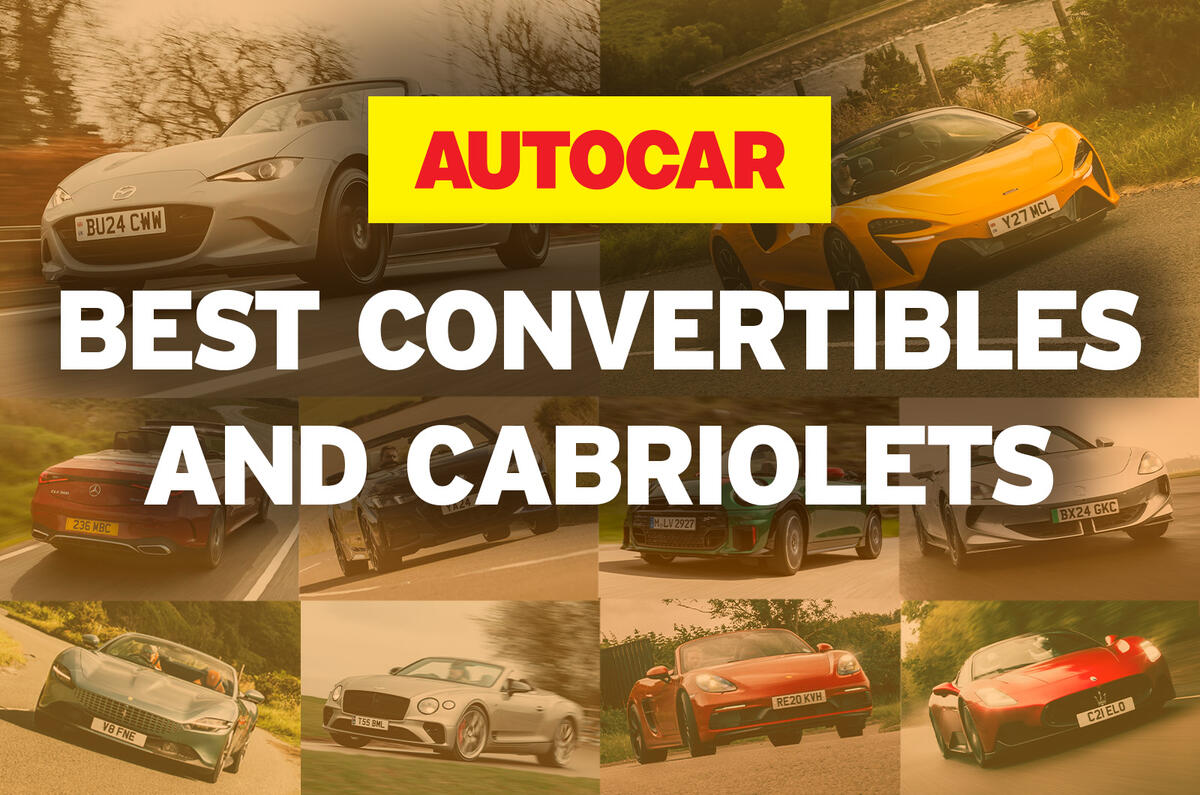The best convertibles and cabriolets – driven, rated and ranked
Alfresco driving is a great way to refresh the senses – and these are the best cars to do it in
News


by Matt Saunders and Jack Warrick
9 mins read
16 July 2025
Share
Summer is in full swing, and if there’s one type of car to enjoy this blistering heat in, it’s a convertible or cabriolet.
There’s no better way to enjoy a country road at this time of year than with the roof down and this list reveals the best convertibles for maximising your driving pleasure.
The great news is that while the number of available options in other sectors of the car market has fallen over the past few years, the choice of convertibles remains pretty broad. Given the range of open-top sports cars, compact cars, grand tourers, mid-engined supercars and many others besides, nobody in the UK could rightly claim to be starved of options.
Our list covers the full spectrum of convertibles, including cabriolets and roadsters, but all of them share the ability to be used every day. Some are affordable and others are more exotic and expensive – but every one of them is a great way to enjoy the elements.
Each car here can turn the humdrum on an ordinary journey into a moment to savour. If you haven’t experienced open-top motoring before, you really should – and any of these machines would provide an excellent introduction.
Our top pick of convertibles in 2025 is the Mazda MX-5, a well-priced option that is truly enjoyable to drive and own. But which models join it in the top 10? Read on to find out…
1. Mazda MX-5
9
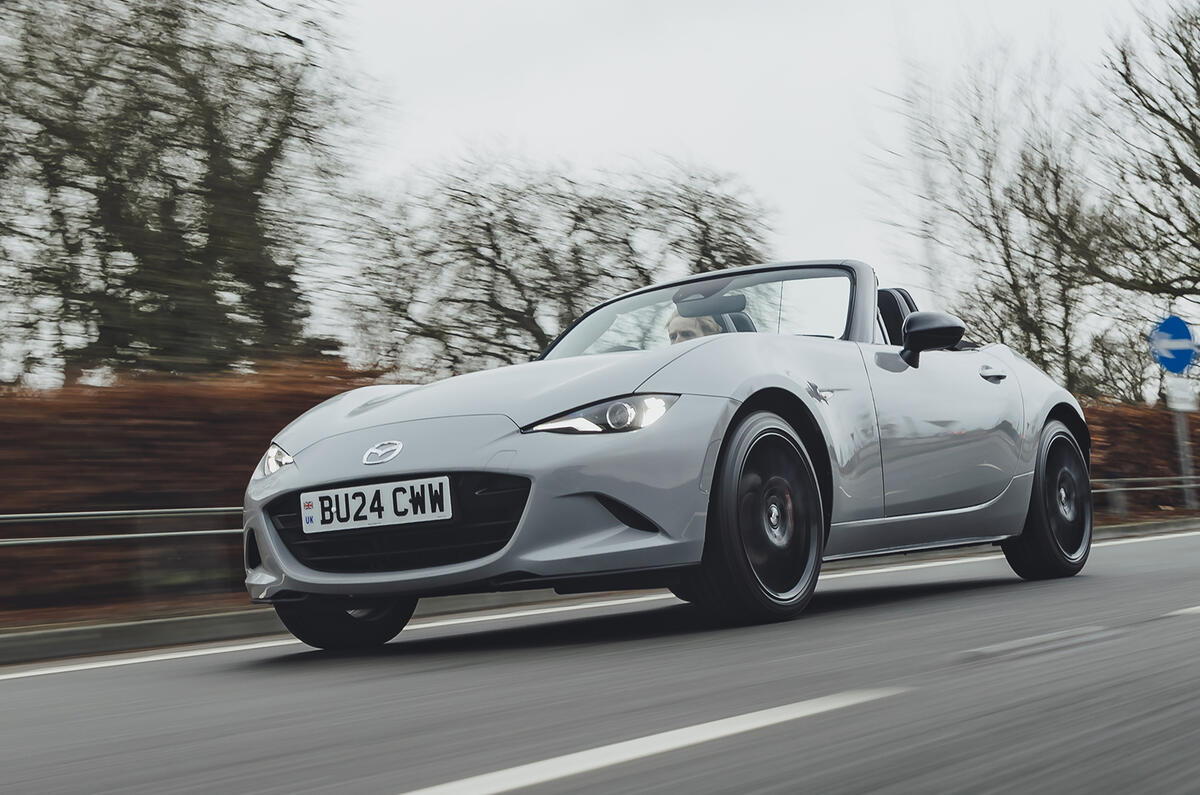
- Design10
- Interior8
- Performance9
- Ride & Handling9
- Costs8
Pros
Spirited performance
Balanced, involving handling
Excellent packaging
Cons
Not as quick as a like-for-like hot hatch
Overly light steering
Imperfect cabin ergonomics
Best for: Value for money
There’s a reason why the Mazda MX-5 is the world’s best-selling roadster.
For a car that offers up as many thrills as the little Mazda does, it is remarkably habitable. The ride is rarely harsh
Actually, there are many. Nearly 35 years after the original made its debut, the compact Japanese two-seater continues to serve up affordable driving fun and represents one of the quickest and easiest ways to enjoy good weather at the drop of a hat (or roof).
A large part of the MX-5’s appeal lies in its traditional front-engined, rear-wheel-drive layout, which delivers agile, engaging, throttle-adjustable handling.
Then there’s the fact that it retains largely the same compact footprint as the 1989 original and weighs around 1000kg. Few driver’s cars feel as lithe and right-sized on the road.
It also means that even the entry-level 130bhp 1.5-litre car feels zingy, although the more muscular 181bhp 2.0-litre model gets firmer suspension, a strengthening strut brace and a limited-slip differential.
The MX-5 is pretty much as easy to live with as any Mazda, thanks to its light and precise controls, excellent build quality and low running costs – and its why it’s the best convertible on sale today.
Read our Mazda MX-5 review
Save money on a new Mazda MX-5 with What Car?
Finance this car with Drivenfi
Latest Reviews

Porsche 911 GT3

BMW iX
9

Used Suzuki Jimny 2018-2020 review
7
Used Suzuki Jimny 2018-2020 review

Skoda Enyaq vRS
7

Audi RS3
8
Read our review
Car review

Mazda MX-5
Fourth-generation MX-5 heads back to Mazda’s roadster’s roots, surpassing its predecessor in every area
Back to top
2. Porsche 718 Boxster
9
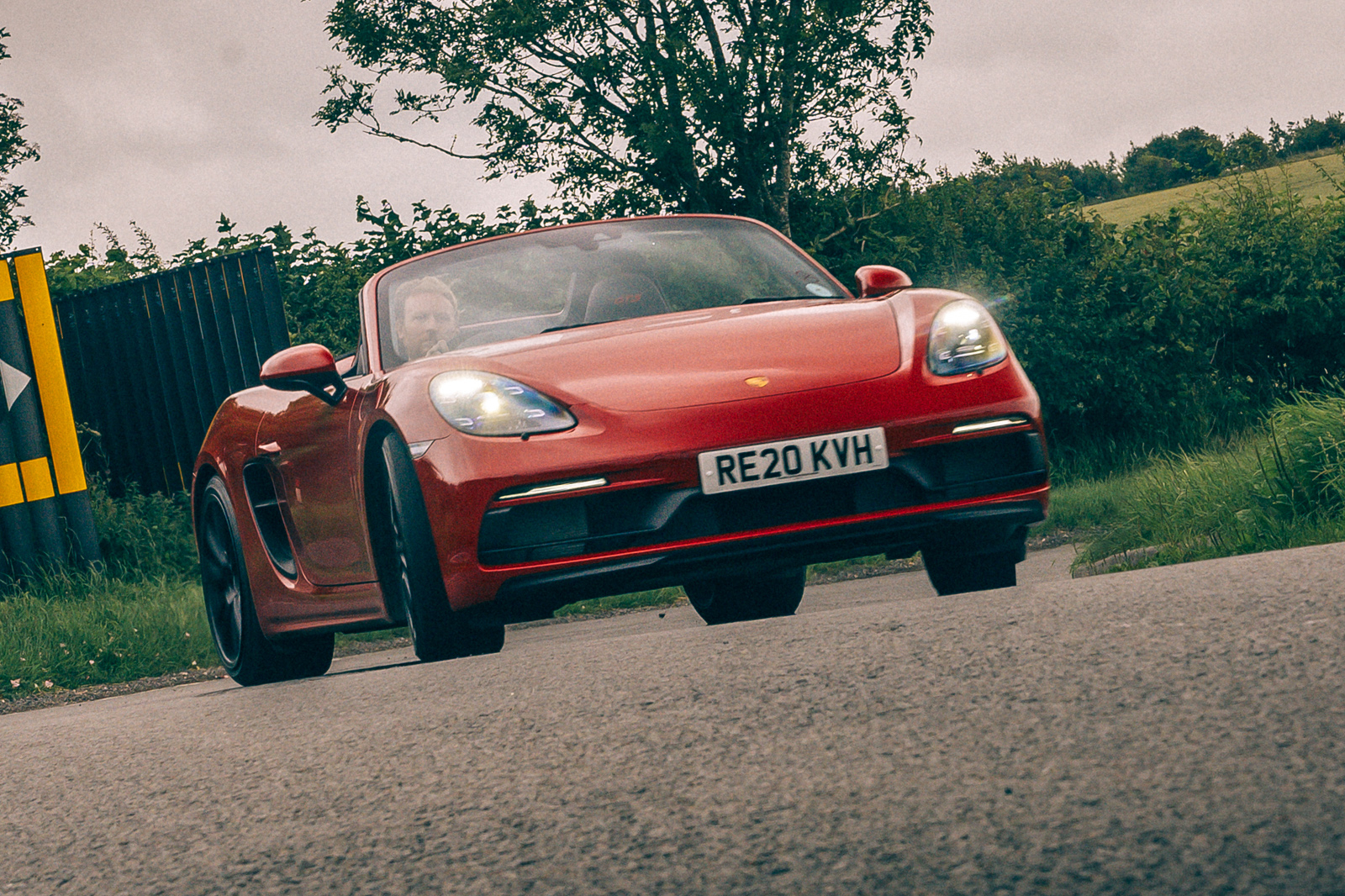
- Design8
- Interior8
- Performance9
- Ride & Handling10
- Costs8
Pros
Amenable performance
Inspired handling
Incredibly comfortable
Cons
Less desirable with a four-pot engine
No great economy gains
Expensive
Best for: Handling
It would be a stretch to call the Porsche 718 Boxster one of Porsche’s best-kept secrets, but its entry-level status and the shadow cast by the legendary 911 mean this mid-engined machine doesn’t always get the credit it deserves.
The Boxster combines transparent sporting pedigree with the kind of wonderfully tied-down comfort levels that make the model endlessly absorbing
When the roads are good and the sun is shining, few cars are more entertaining than this. All Boxsters get better when the roof is down – something that can be easily achieved with the touch of a button.
The arrival of four-cylinder engines in 2016 robbed the Boxster of some of its audible appeal, but there’s no doubting the potency of the turbocharged units, which beat the old 2.7- and 3.2-litre flat sixes for easily accessible straight-line pace.
If you do want the full mechanical orchestra, the flat-six 4.0-litre GTS will happily provide it – or if you have a larger budget, there’s even the epic, 911 GT3-engined, Porsche 718 Boxster Spyder RS.
Regardless of engine, it’s the Boxster’s chassis that shines the brightest, with the perfectly balanced, tactile handling drawing you into the action. Then there’s the perfectly weighted steering, the strong and delicately balanced grip, the cast-iron body control and brakes that are as progressive as they are powerful.
Sure, it’s not cheap, but the incredible engineering and depth of ability on offer make the Boxster feel like it’s worth every penny.
Read our Porsche 718 Boxster review
Save money on a new Porsche 718 Boxster with What Car?
Finance this car with Drivenfi
3. Ferrari Roma Spider
9
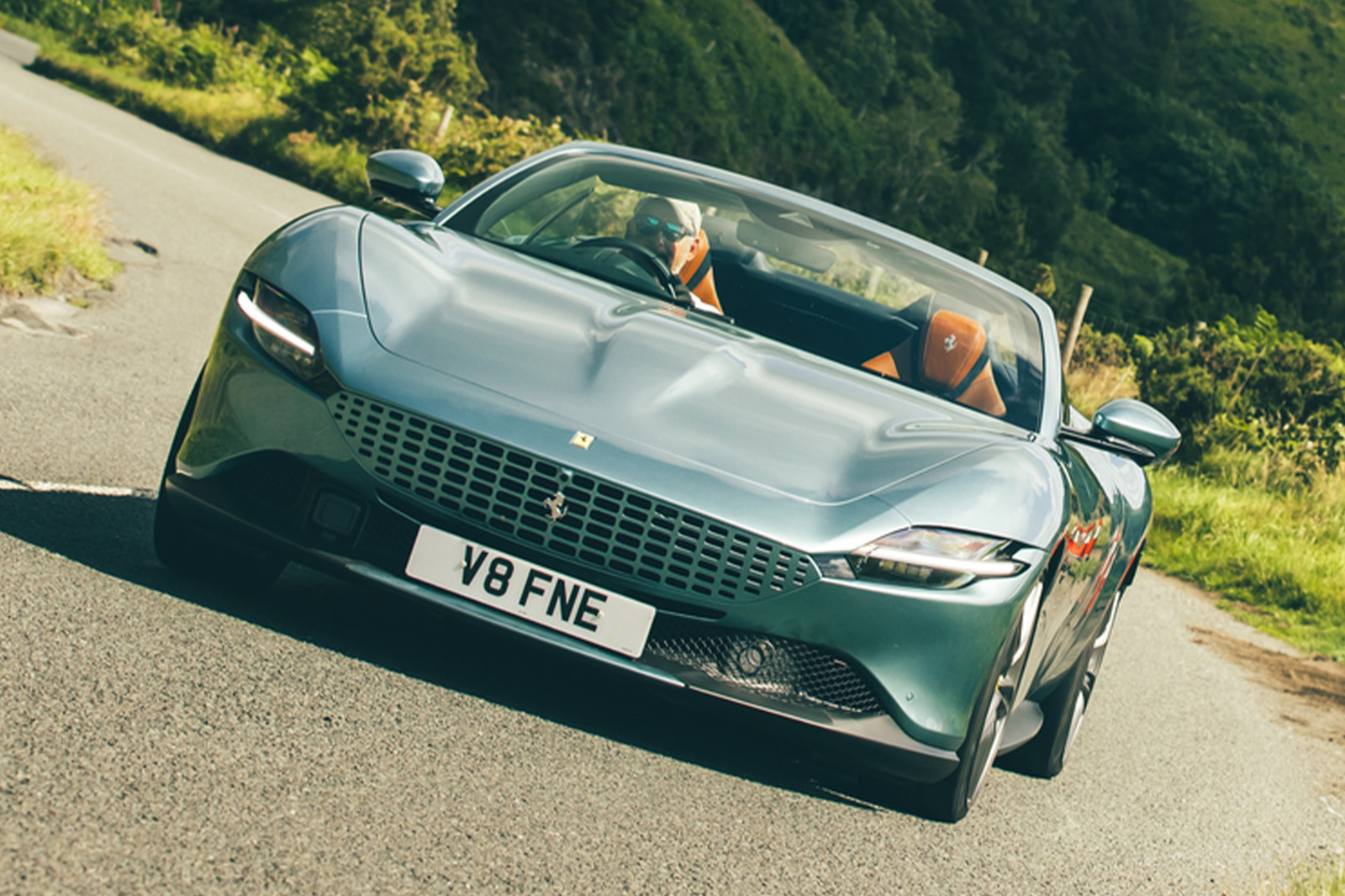
- Design10
- Interior8
- Performance8
- Ride & Handling9
- Costs9
Pros
Still a great sports car, despite the loss of the roof
Very little turbulence at speed
Superb handling
Cons
Flat-plane V8 lacks some charisma
Haptic steering wheel buttons still frustrate despite update
Best for: V8 lovers
The Ferrari Roma represents a fresh take on an affordable Ferrari, yet it retains the essence of the Prancing Horse’s classic models.
In practice, the Roma doesn’t lose much in the way of refinement, whether roof up or roof down
This front-engined, V8-powered 2+2 exudes timeless aesthetics, shares its platform with the Portofino and is available as a drop-top Spider as well as a fixed-head coupé.
Despite losing its roof, its handling and appearance are still top-notch. It remains relatively compact, appealingly attainable and a daily-usable sporting GT.
The Roma delivers the performance, excitement and handling vibrancy expected of a true Ferrari, combined with a cabin and character designed for extensive mileage.
Powered by a 3.9-litre twin-turbo V8, the Roma generates over 600bhp and a top speed nearing 200mph.
Its comfortable and sophisticated interior is particularly striking, offering ease of use and cutting-edge technology. That said, those haptic touchpad controls are less than ideal at best and frustrating as worst.
Read our Ferrari Roma Spider review
Save money on a new Ferrari Roma with What Car?
Finance this car with Drivenfi
Back to top
4. McLaren Artura Spider
9
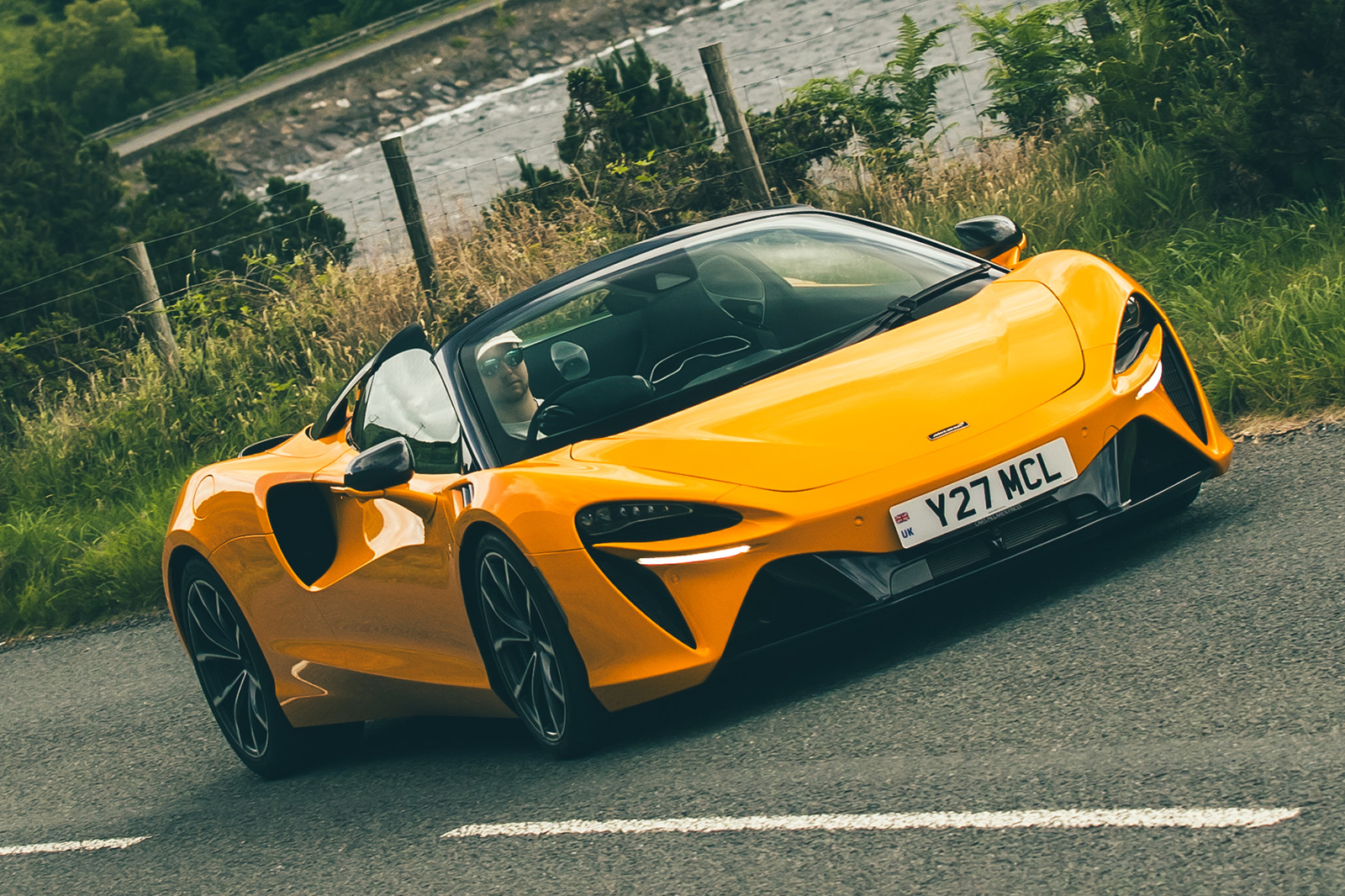
- Design9
- Interior8
- Performance9
- Ride & Handling9
- Costs8
Pros
Efficient mechanical packaging and effective lightweight design
Motors combine smoothly for uncompromisingly fast performance
Poised, tactile, absorbing handling shows little evidence of added weight
Cons
2025-model-year revisions have firmed up the ride a little
Still lacks the outright agility and balance of some key rivals
Real-world electric range is limited to around 17 miles
Best for: All-around ability
The McLaren Artura Spider is a totally different proposition from the other models on this top 10 list – and it’s so good that we named it Britain’s Best Driver’s Car of 2025.
The Artura is a very ambitious and skilfully executed example of modern supercar packaging and lightweight design.
Combining a 690bhp 3.0-litre V6 petrol engine with a 94bhp electric motor, the Artura is a plug-in hybrid. Its 7.4kWh battery offered around 17 miles of electric range in the real world during our tests.
While the Artura Spider is brutally fast (it’ll hit 0-62mph in less than 3.0sec), perhaps its best party trick is its silent start-up, owing to its hybridisation. Silently wiggling through traffic (with the roof down, of course) never gets old.
When the V6 does burst into life, you’re greeted with a sumptuous engine note, with performance boosted by that electric motor.
Comfortable, agile and with a real sense of occasion, the Artura is an excellent convertible, if you can afford that £220,000 list price.
Read our McLaren Artura Spider review
Save money on a McLaren Artura with What Car?
Finance this car with Drivenfi
5. Maserati MC20 Cielo
8
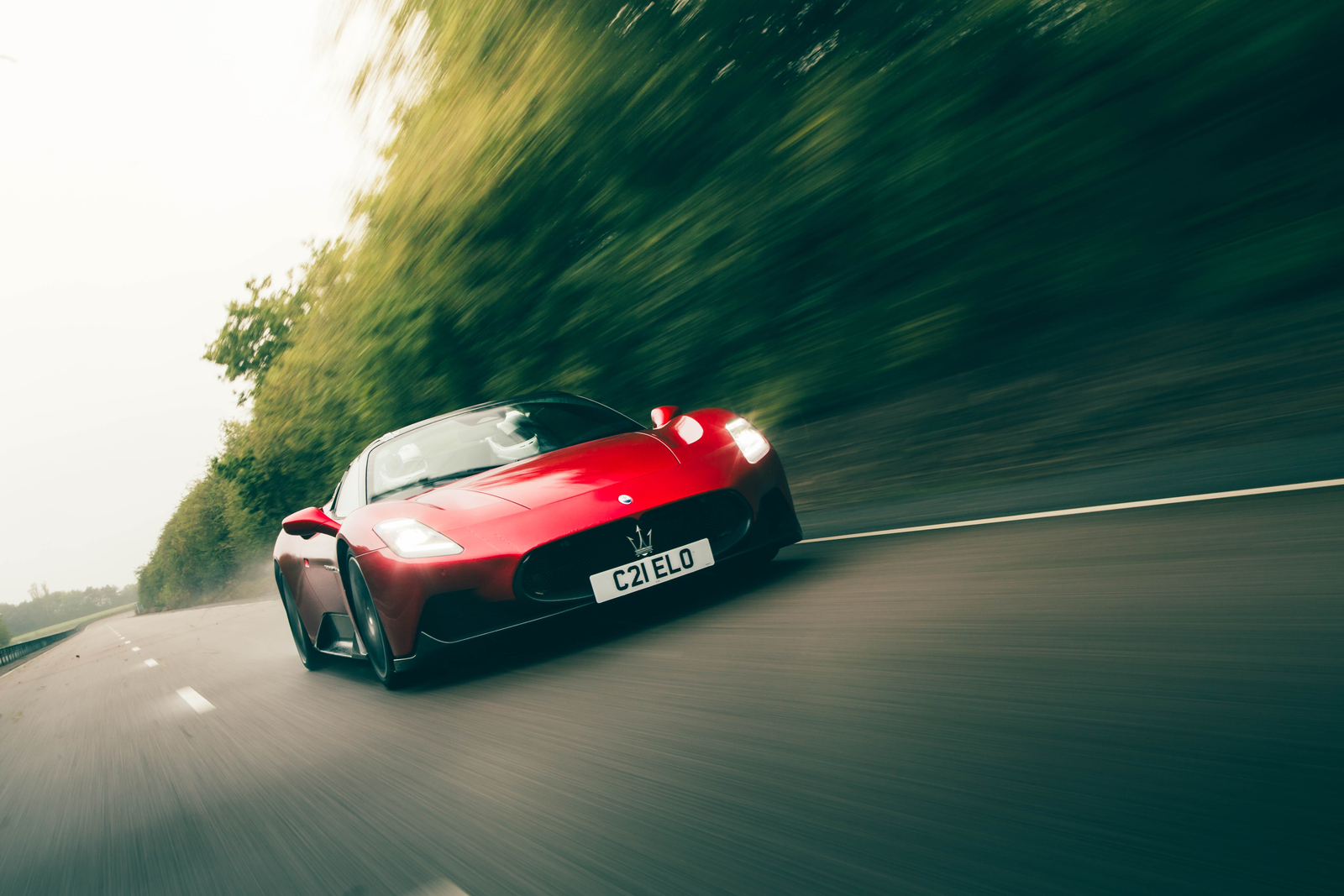
- Design8
- Interior8
- Performance8
- Ride & Handling9
- Costs4
Pros
Beautiful to behold
Rides comfortably
Undemanding to drive for a supercar
Cons
It’s over £230,000
It doesn’t excite like some other mid-engined Italians
Best for: Grand tours
Mid-engined sports cars and supercars were for so long far better sampled as hard-top ‘berlinettas’ than cloth-roofed ‘spiders’, because they traded so much body rigidity for that convertible status. But modern carbonfibre-tubbed supercars like the Maserati MC20 are changing all that.
The MC20 is joyfully light-hearted in dynamic terms, thunderously characterful and versatile enough to use often.
The MC20, which will change its name to the MCPura as part of a mid-life refresh, is a supple-riding, light-touch grand tourer among mid-engined options.
It has surprisingly gentle suspension, fluent, low-effort steering and a turbocharged V6 engine with lots of accessible torque that responds well to a more relaxed pace.
Remove the roof and you can simply enjoy more of the car’s charms in a richer groove and in the laid-back touring mode of operation that its tuning encourages.
The roof itself is a folding metal panel with a built-in photochromic glass panel so, unlike with so many cloth roofs, you needn’t fold it back at all to enjoy an enhanced view of the world outside.
Read our Maserati MC20 Cielo review
Save money on a new Maserati MC20 with What Car?
Finance this car with Drivenfi
Back to top
6. Bentley Continental GTC
8
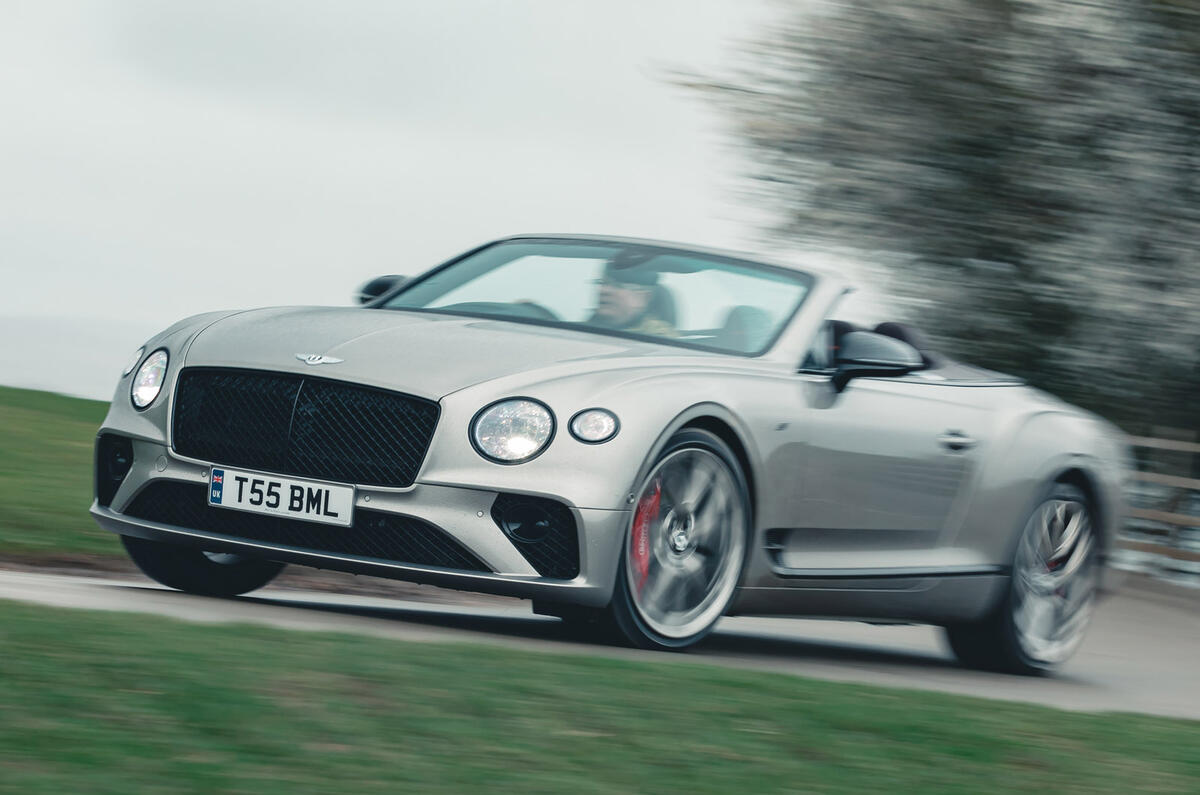
- Design8
- Interior8
- Performance9
- Ride & Handling9
- Costs7
Pros
TVR-redolent Sport-mode exhaust note
Adds V8 charm and dynamism but sacrifices nothing on comfort
Convertible grand touring driving experience is enduringly special
Cons
Goes quite heavy on black exterior body trim
Weight and luxury tuning slightly hinder driving appeal
Expensive
Best for: Luxury
Could this be the ultimate iteration of the Bentley Continental GT? If you’re going to have one of the most opulent, expensive and attention-grabbing grand tourers of the lot, you might as well go the whole hog and choose the convertible, so you can more clearly see the world that you’re lording it over.
Bentley’s chassis engineers are becoming increasingly well practised and familiar with the capabilities of both the platform and the chassis technologies they are working with.
Bentley’s hugely decadent W12 has been retired now, but the Conti has always been at its best with the twin-turbocharged 4.0-litre V8 and in driver-oriented S guise.
With 543bhp, it has more than enough velvet-lined muscle to get a real wriggle on when you’re in a hurry, while aurally it runs the gamut from bellowing brute to something altogether softer and more restrained when just cruising.
The V8 also acts like less of a boat anchor in the nose than the W12 did, which helps the big Bentley feel remarkably light on its feet when pressing on through a series of corners.
Of course, it’s still a luxury GT at heart, so the air suspension can waft with the best of them, while the interior embraces you and three travelling companions in true splendour. The richness of the materials, quality of the craftsmanship and sheer sense of occasion are hard to beat.
Throw in the appeal of a folding fabric roof that’s coupé-quiet when erected yet drops in a matter of second to allow you bask in the glow of admiring (or resentful) looks and you have one of the most opulently desirable drop-tops on the planet. Just add the Côte d’Azure for the ultimate convertible experience.
Read our Bentley Continental GTC review
Save money on a new Bentley Continental GTC with What Car?
Finance this car with Drivenfi
7. BMW 4 Series Convertible
8
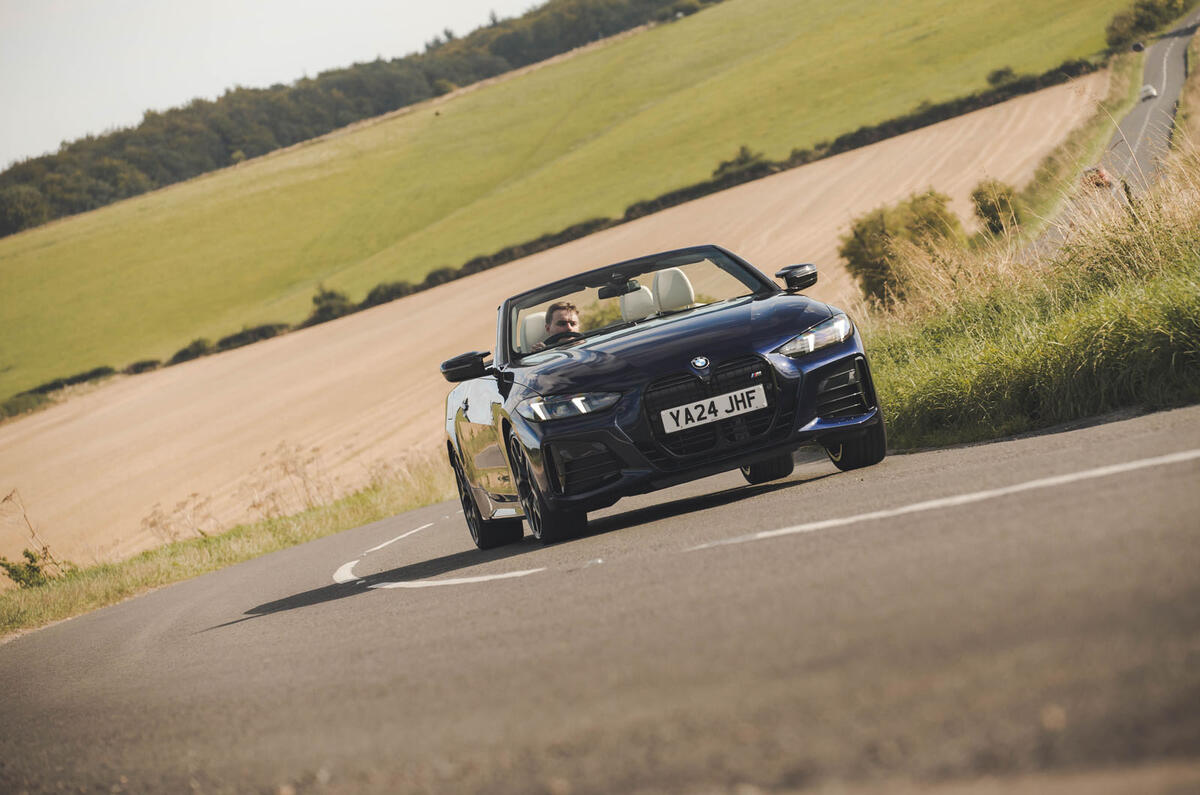
- Design8
- Interior8
- Performance8
- Ride & Handling9
- Costs8
Pros
Four-wheel-drive chassis doesn’t disappoint
Responsive engine line-up
Cons
Lacks the understated visual grace of its predecessors
Needs optional adaptive suspension to ride comfortably
Best for: Daily driving
Like the BMW Z4 roadster, the BMW 4 Series Convertible has swapped a folding metal roof for a lighter cloth affair.
The 4 Series’s standard equipment tally is marginally more generous than that of the 3 Series, but buyers should expect to spend extra on the optional M Sport Pro package
It’s also changed its engine selection, which might be off-putting for some. Diesel is out, and petrol options are now limited to the rear-driven 420i with 184bhp, or the 369bhp four-wheel-drive M440i.
Regardless, it’s still one of the best convertibles on sale today, largely because BMW has boosted cabin isolation and cruising refinement for this generation.
It’s the sort of convertible you can easily hold a conversation in when the roof is down and the windows are up. And if refinement really is a high priority for you, you’d do best to avoid the M440i and its run-flat tyres.
Driver appeal is stronger than it was in the floppier former version and perceived cabin quality has likewise taken a leap.
This is a very complete convertible, in other words and – front-end styling aside, perhaps – an easy one to recommend to anyone.
Read our BMW 4 Series Convertible review
Save money on a new BMW 4 Series Convertible with What Car?
Finance this car with Drivenfi
Back to top
8. Mercedes-Benz CLE Cabirolet
8
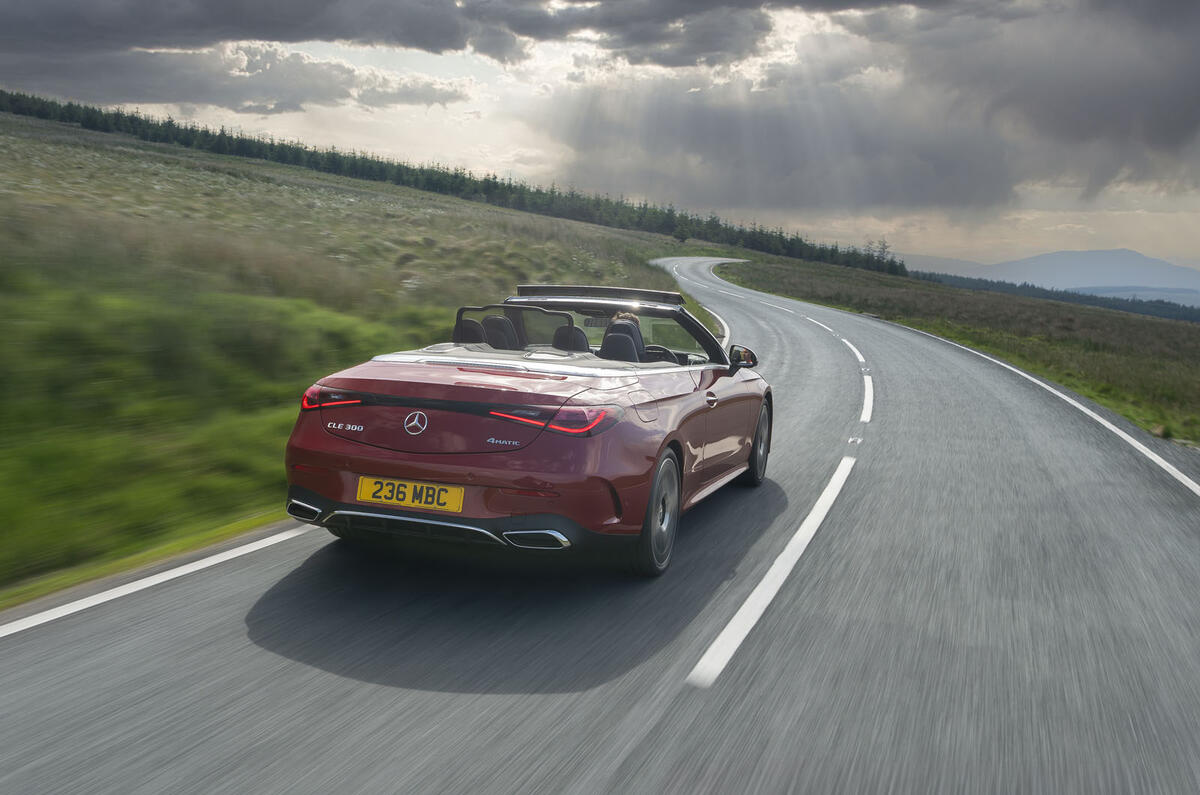
- Design8
- Interior7
- Performance8
- Ride & Handling8
- Costs8
Pros
Great touring refinement and comfort
High level of technology
Cons
Less handling appeal than the coupé
Body loses some control when pressing on
Best for: Commutes
The CLE Cabriolet might be the best choice for you if you’re after refined thrills and excellent cruising manners.
The CLE Cabriolet feels like a well-composed convertible with just enough material richness and cabin isolation to match its luxury billing
This is the largest convertible in the mid-sized segment, but don’t let that put you off. It drives every bit as well as the coupé version of the CLE, matching its hard-top counterpart in terms of refinement, comfort and technology.
Its comfort is bolstered further by the standard fitment of Mercedes’ Aircap feature, which has been fine-tuned to improve cabin isolation.
It’s a convertible for those who value laid-back cruising over hardcore handling and is at its best when you adopt a relaxed pace. The CLE Cabriolet delivers a smooth, easygoing and comfortable driving experience.
It’s no great drop-top sports car but, at a cruise, it’s a solid performer that can be enjoyed roof up or roof down.
Read our Mercedes-Benz CLE Cabirolet review
Save money on a new Mercedes CLE Cabriolet with What Car?
Finance this car with Drivenfi
9. Mini Convertible
8
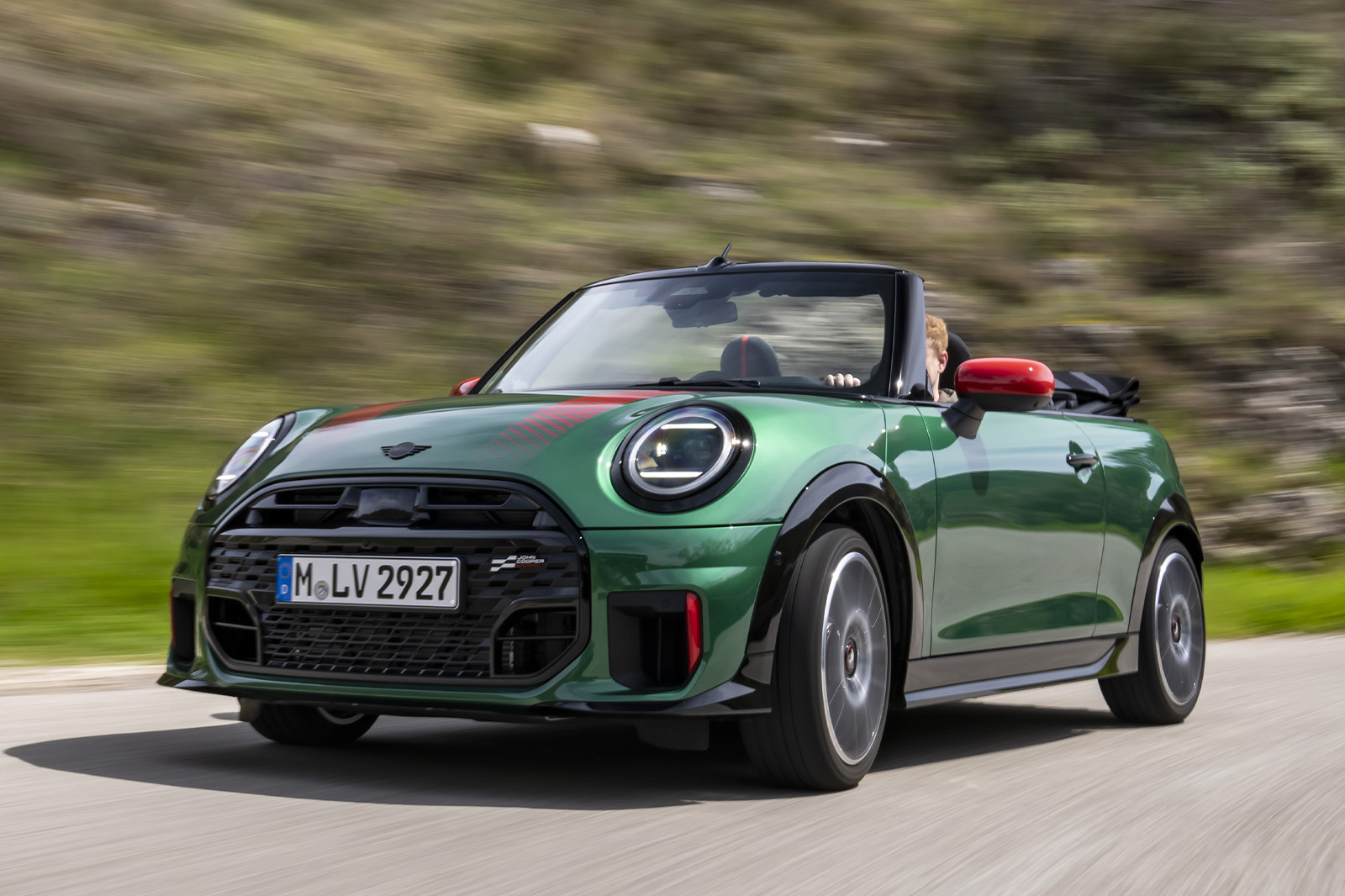
- Design10
- Interior8
- Performance8
- Ride & Handling9
- Costs8
Pros
Fun to punt along tight, winding roads
Convertible hatch doesn’t impact on interior space
Entertaining handling
Cons
No manual gearbox option
Central touchscreen has a lot to do and isn’t very user-friendly
Very firm ride
Best for: Weekend trips
The Mini Convertible has been a British staple since 2004 and it’s still a top pick in the drop-top scene today.
The idea of an agile, frothy and style-focused drop-top will appeal to many, so even if it isn’t quite as sharp as the standard hatch, they’ll find plenty to like about the Convertible
Okay, so Mini is technically owned by German giant BMW, but at least this latest-generation Convertible is actually being built back in Oxford for the first time in nine years.
Like the regular Mini hatch, the convertible is available in C, S and performance John Cooper Works guise, starting with 154bhp and rising as high as 316bhp in its punchiest variant.
You should know, though, that there’s no manual gearbox this time around, and unless you opt for the Sport trim level, you also won’t get paddle shifters.
Either way, the Mini Convertible feels as good to drive as evere, with an entertaining chassis and superb stability. It’s a shame there’s no EV on the way, though.
Read our Mini Convertible review
Save money on a new Mini Cooper with What Car?
Finance this car with Drivenfi
Back to top
10. MG Cyberster
7
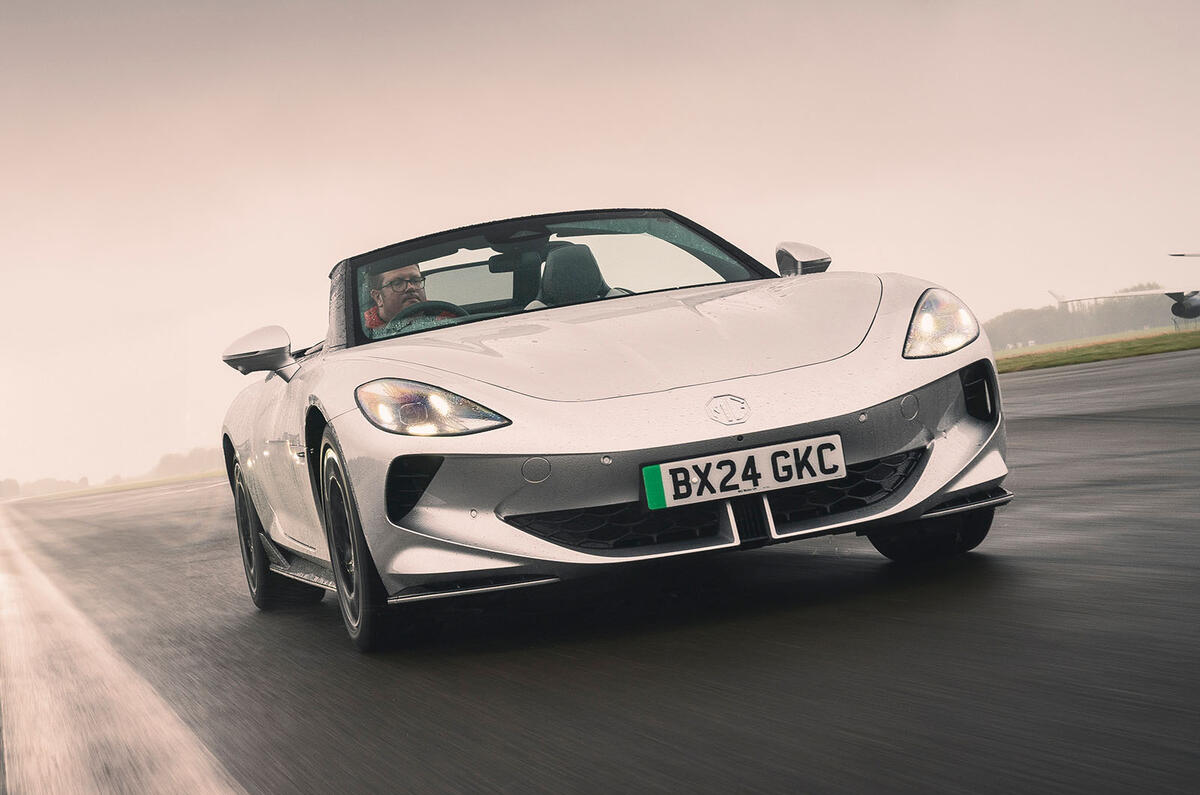
- Design8
- Interior6
- Performance8
- Ride & Handling6
- Costs7
Pros
Scissor-door looks will prompt many a double-take
Good usability, with commendable range and cargo space
Beats plenty of combustion-engined opponents on value
Cons
High driving position leaves you a little exposed with the roof down
Infotainment and ADAS features can distract and frustrate
Patchy body control lets the car heave and pitch on country roads
Best for: EV enthusiasts
The MG Cyberster is significant for the Chinese-owned British brand because it is the UK’s first electric convertible.
It offers decent usable range, plenty of cabriolet-class usability, and big twin-motor performance for those who want to keep up with the Tesla crowd.
Equipped with a 77kWh battery, the Cyberster offers a claimed range of 276 miles. Its dual-motor configuration delivers a combined 503bhp and 535lb ft, allowing it to 0-62mph in just 3.2sec. A single-motor, rear-wheel-drive option is also available.
To its credit, it combines engaging handling with a supple and controlled ride, making it enjoyable even when not driven spiritedly.
The Cyberster represents a comeback for MG in the sports car segment and its pricing is noteworthy for a car of this type and performance. The single-motor model starts at £54,995, while the all-wheel-drive variant is priced at £59,995


